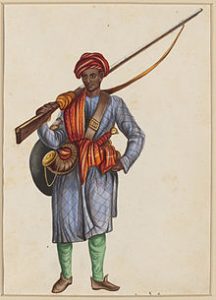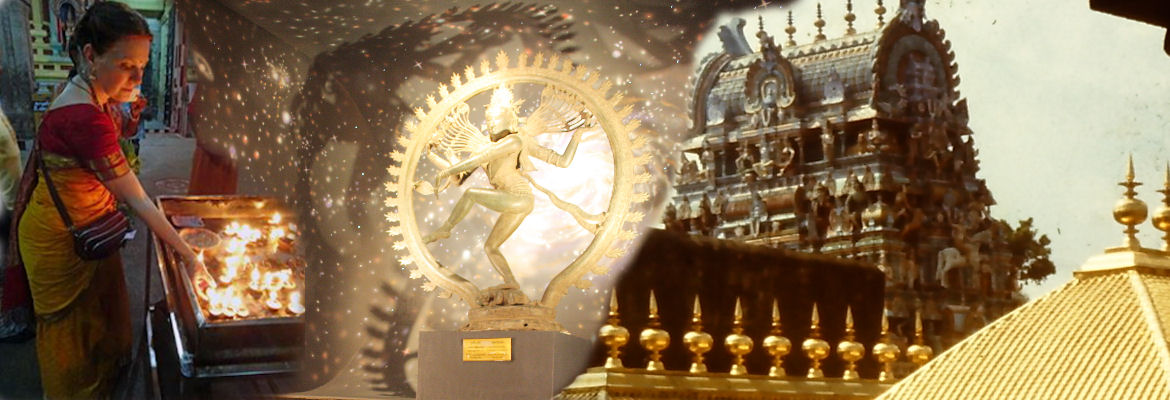Here I continue my translation of the works of Jacob Haafner, who lived and worked on the Coromandel in the latter part of the 18th century. Haafner was a great lover of India and its people and had a deep dislike of the English. Here starts a three part series in which he describes the first battle between the troops of Hyder Ali Khan of Mysore, led by his son Tippu Sultan at a place near Chinglepet called Perambani. It is better known in history as the battle of Pollilur. Today the village is called Pullalur. It is located some 10 km north of Kanchipuram. Haafner introduces his account by describing a meeting a with a survivor of that battle in a rest house. It will be published in three parts.
The tough march had exhausted my travel companion Huau; he went to sleep immediately after dinner. I wanted to follow him in this – but the fierce thunder, the splashing of the rain, the noise of so many people together – made it impossible for me. I sat up again, lit a cigar; and under the hope of finding someone, with whom I could enter into conversation, to spend the time, I noticed not far from me, a Moor or Mohammedan – who was sitting all alone, chewing his betel.

I beckoned to him, and poured him a glass of arrack (*); after I had first rinsed it with the liquor. He took it politely, though with the left hand, at the same time requesting me also to excuse him, because of this impoliteness (†), in that he lacked his right – he had lost it as Sepoy, in the battle of Perambani.
(*) Most of the Mohammedans, would suffer death rather than to drink wine; because Mahomed has banned it according to the Koran strictly; but because he didn’t speak in his prohibition of any arrack or other strong liquors, they think that they are free, to use this without shyness, and with pleasure, without fear or guilt to themselves, or to violate the laws of the Prophet.
(†) It is considered by the Indians to be a great impoliteness, to give or receive anything with the left hand. They will not even touch their own food with that hand, because they use them for all sorts of impure pursuits.
I was delighted to meet someone who had attended this event personally and invited my Moorish friend to sit himself down on the mat with me, and to tell me of the details of this, for the English so fateful, battle, which he immediately was willing to do. His story of this battle, being completely consistent with what was known to me from other credible sources, I dare to offer the reader as genuine, with some needful explanations and additions.
The Battle of Perambani.
It was at the very beginning of the war between the English and the Nabab of Massour, Hyder Alichan Bahader, in 1780; the Lieutenant Colonel Baily, with 800 Europeans infantry, 10 battalions Sepoys, some gunners, and 15 guns, returning from the province Guntur (which he had been plundering), to unite with the great army, under the Major General Sir Hector Munro (who was camped not far from Chengleput,).
The bad Monsoon had just deployed itself; some rivers, which he had to cross were already very swollen, which obstructed and delayed his march somewhat, but by the enemy he was not troubled, except by some wandering horseman bands, which occasionally made a point of wanting to attack in his rear. But, as it turned out afterwards, had only been intended to watch him, and inform Tippoo Saheb (*) of all his movements; who had placed a strong detachment of elite troops between him and Munro – and awaited him.
(*) Son of Hyder Alichan. In the continuation of this work, I will speak at length of the life, the deeds and the fatal end of the unfortunate Tippoo Saheb.
As soon as Baily received the explicit news of this, he stopped, judging himself to be too weak, to face the enemy.
Immediately he sent several Harkarrahs (* messenger, also spy) to General Munro, notifying him of the enemy’s intention and of his precarious and perilous state and requesting him to make a forward a motion with the great army, thereby favoring his union with him – and make the enemy pull back.
But Munro continued (the reasons for which I am unaware) motionless in his camp, without the least worry, it seemed, for Baily. Only three days later, he sent the Colonel Fletcher to him to help, with a company Cadets, two regiments Mountain Scots, and twenty companies grenadier Sepoys.
This detachment arrived, after having taken a wide detour, successfully to Baily; who, now believing to be strong enough to confront Tippoo Saheb, as soon as he might attack him, once again went on his way, without perceiving anything of the enemy (except a few light troops riders/cavalry, vaulting in the distance, who steadily stayed with him). Not even there where he expected it, in strength, to challenge him the way.
Continue to read part 2 HERE
Thank you for your visit,
Liesbeth Pankaja

Leave a Reply
You must be logged in to post a comment.